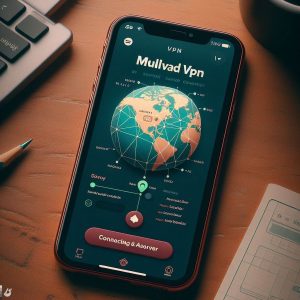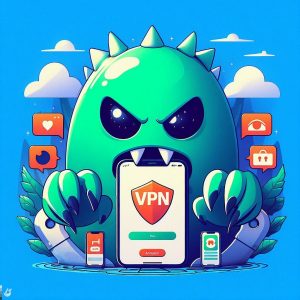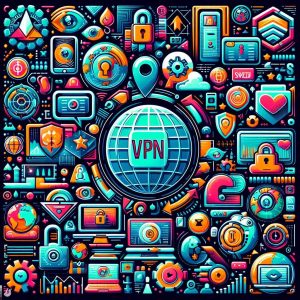Introduction
NordVPN is one of the most well-known and trusted names in the virtual private network (VPN) industry. Since its founding in 2012, NordVPN has established a reputation for providing robust security and privacy for internet users. With over 5,200 servers worldwide, NordVPN offers the ability to encrypt internet traffic, hide IP addresses, bypass geographic restrictions, and secure data on public Wi-Fi networks.
A key reason why so many internet users choose NordVPN is because of its strong commitment to security. As cyber threats become more sophisticated, the need for comprehensive online security continues to grow. Using a VPN service that prioritizes advanced security features is a vital way for internet users to protect their data and privacy. By leveraging industry-leading encryption protocols and technologies, NordVPN aims to provide the most secure VPN experience possible.
This article will take an in-depth look at the various security capabilities and enhancements offered by NordVPN. It will examine NordVPN’s core security features, ongoing improvements to strengthen protection, bundled security product offerings, pricing/plans focused on security, and why NordVPN is regarded as one of the most secure VPN providers available today.

NordVPN Security Features
NordVPN incorporates multiple key security features to safeguard user data and online activity. These include powerful encryption protocols, a kill switch feature, double VPN functionality, and cyber threat protection.
Encryption
The foundation of NordVPN’s security is the use of strong encryption protocols for all internet traffic passing through its servers. Encryption encodes data so that it cannot be read by unauthorized parties. NordVPN offers both IKEv2/IPsec and OpenVPN encryption protocols.
IKEv2/IPsec provides rapid and efficient encryption ideal for mobile devices. This protocol is increasingly becoming an industry standard due to its high degree of security and speed. Meanwhile, OpenVPN utilizes OpenSSL libraries and 256-bit encryption to secure data. OpenVPN enables users to choose from a range of encryption algorithms, including AES-256-CBC, AES-128-CBC, and AES-256-GCM.
By leveraging these state-of-the-art encryption protocols, NordVPN can effectively scramble and anonymize user data to prevent snooping or external attacks. The encrypted tunnel protects information from hackers, internet service providers, government surveillance, and other threats when using public Wi-Fi or accessing restricted content.
Kill Switch
In addition to encryption, all NordVPN applications have a kill switch feature. This shuts off internet access completely if the VPN connection abruptly drops. The kill switch works by monitoring network traffic and blocking all incoming and outgoing data if the VPN connection fails.
This feature is critical in preventing private data leaks. Without a kill switch, the loss of a VPN connection could expose a user’s true IP address or allow data to transmit unencrypted. By immediately cutting off all internet access, NordVPN’s kill switch stops any sensitive information from leaking outside of the encrypted VPN tunnel. This helps ensure users avoid disruptions to their privacy or security.
Double VPN
NordVPN also provides an extra layer of security through its Double VPN feature. With Double VPN, user traffic gets encrypted not once, but twice through routing connections in sequence across two separate VPN servers.
By chaining together two servers, the source of the traffic becomes far more obscured. Even if the first server IP address is compromised, the second encrypted tunnel hides the user’s identity. Double VPN makes it exponentially harder for advanced persistent cyber threats to track trace user activity, greatly strengthening privacy and security.
Cyber Threat Protection
Finally, NordVPN includes a specialized cyber threat protection feature focused on blocking ads, trackers, malware, and other dangerous vectors. By analyzing site content and connections in real-time, NordVPN can identify and shut down various attack techniques before they reach a user’s device.
This innovative capability provides comprehensive monitoring that safeguards users against far-reaching online threats. Going beyond standard VPN activity, active cyber threat protection gives users an extra level of automated security against the most sophisticated hackers and cybercriminals attempting to exploit vulnerabilities.

Ongoing Security Enhancements
Rather than resting on its robust existing security features, NordVPN maintains a dedicated focus on constantly improving protection for its users. This manifests through partnerships with cybersecurity leaders, infrastructure upgrades, and code audits to reinforce privacy safeguards.
External Security Partnerships
In 2020, NordVPN formed a partnership with VerSprite, a leading cybersecurity consulting firm. By leveraging external expertise, NordVPN facilitates regular security reviews and testing to identify potential issues before they arise.
This relationship also speeds the patching of any discovered vulnerabilities. Partnerships with well-respected security companies demonstrate NordVPN’s willingness to invest substantially in staying ahead of emerging threats.
Infrastructure and Code Audits
In addition to consulting partnerships, NordVPN undertakes extensive internal infrastructure and code audits on an ongoing basis. In 2021, NordVPN finished rewriting its entire codebase from scratch to strengthen its systems and software functionality.
This enormous undertaking required over 35,000 programmer hours but enables optimized performance and heightened security. NordVPN also upgraded its server disk encryption to repel sophisticated physical data center attacks.
These massive infrastructure investments and code integrity improvements help NordVPN address security flaws other VPN providers may overlook. Users can access NordVPN’s services with full confidence in the safety of its latest network technology and software code foundation.
NordVPN Bundles
While NordVPN provides industry-leading security on its own, even greater protection emerges from combining it with other Nord Security products. NordVPN offers bundled deals that integrate advanced security tools focused on passwords, files, finances, and personal records.
Nord Security Suites
NordVPN’s Standard suite bundles the NordVPN service with NordPass password manager. NordPass stores encrypted passwords behind one master key while blocking trackers that seek to collect login credentials and personal information.
Meanwhile, the NordVPN Plus suite incorporates NordLocker file encryption. NordLocker safeguards important documents like tax records, property deeds, or confidential business materials via end-to-end file encryption, zero-knowledge architecture, and other robust privacy technologies.
Finally, the Complete suite from NordVPN adds NordPass Teams for password management across groups alongside NordPass Identity digital credential storage. This full product suite provides customers with an all-encompassing security solution encompassing VPN protection, password security, encrypted file lockers, and digital wallets.
Comprehensive Online Security
By integrating its industry-best VPN with advanced encryption models for passwords, personal records, and sensitive files, Nord Security’s bundled suites offer comprehensive protection for online activity. The Complete bundle in particular establishes fortress-like security across the vectors most targeted by hackers – web history, account credentials, private files, and identity records.
While NordVPN alone has gained renown for its focus on state-of-the-art security, its product bundles with other Nord Security solutions take protection to even greater heights through layered next-generation encryption applied across multiple facets of digital and online activity.

Pricing and Plans
NordVPN provides users significant flexibility in how they access its security services. Subscribers can choose between monthly, 1-year, and 2-year plans. Longer subscription commitments deliver greater cost savings for those prioritizing robust security.
Subscription Options
The monthly NordVPN plan allows casual users to evaluate the service on a trial basis without lengthy commitments. However, the monthly plan carries a comparatively high recurring cost. Users seeking to maximize savings can select NordVPN’s 2-year subscription for the lowest effective monthly rate.
1-year subscriptions represent a middle-ground for balancing affordability against longer commitments. All subscriptions provide identical access to the same elite NordVPN security features detailed throughout this article. The pricing difference lies in the length of plan rather than security capability variations.
Emphasis on Length of Subscription
NordVPN’s product pricing clearly emphasizes substantial cost savings for those able to commit to longer 2-year subscriptions. Users receive over 65% off compared to monthly rates when selecting NordVPN’s longest subscription package.
The company transparently signals that more patient users gain significantly improved affordability. For anyone prioritizing world-class VPN security, NordVPN’s 2-year subscription clearly offers the most compelling value while maintaining equal and unlimited access to the service’s entire gamut of robust privacy protections.
Conclusion
NordVPN rightfully deserves its status as one of the most respected and secure VPN services available. Through industry-leading encryption protocols like OpenVPN and IKEv2/IPsec, NordVPN effectively safeguards user data from prying eyes. Additional features such as a VPN kill switch, Double VPN, and cyber threat protection provide overlapping security layers for comprehensive defense.
Rather than becoming complacent, NordVPN actively invests in continuous security improvements in areas like infrastructure upgrades, code auditing, and external consulting. Bundling NordVPN with complementary encryption-focused tools for passwords, files, and personal records enhances protection even further. With flexible pricing prioritizing lengthy subscriptions, NordVPN combines air-tight security with significant cost savings. For these reasons, NordVPN remains a top choice for any user prioritizing private and anonymous internet access.
Mullvad VPN is a Sweden-based virtual private network service that has earned praise as one of the most privacy-focused options available. This Mullvad VPN review will provide an in-depth analysis of its capabilities around security, speeds, streaming, pricing, and more to determine if its niche appeal measures up to competitors for different user needs.
Overview
Mullvad VPN sets itself apart by making user privacy and anonymity its foremost priority above other considerations. From offering completely anonymous sign-ups requiring only an account number to its independently audited no-logs policy, the provider goes further than most to remove identifying user information.
It also provides high-speed Wireguard connections and advanced leak protection across apps for all major platforms. One trade-off is limited configuration options and sparse interface design in favor of hardened security. Still, with top-notch 256-bit AES encryption, port forwarding support, and reliability audits from firms like Cure53, Mullvad remains a go-to solution for the privacy conscious.

Pros
- Good speeds: Mullvad ensures consistently fast VPN speeds by making use of top-tier server infrastructure and the modern WireGuard protocol. This allows low-latency HD video streaming and rapid file downloads.
- Enhanced anonymity: By only requiring an account number instead of usernames or emails, Mullvad enables anonymous sign-ups and near-complete user anonymity. Features like multi-hop connections, Tor overlay support, and Bitcoin payments further cover tracks.
- Easy Windows usage: Despite the pared back interface, using the Windows Mullvad app offers effortless connection options ideal for first-time VPN users. Server locations are readily changed under the hood icon menu.
- Cash and email-less account setup: Users need only generate an anonymous account number before paying directly via cash or cryptocurrency. No personally identifiable information gets collected, boosting privacy.
- Strict no-logs policy: An independent audit confirmed Mullvad’s zero-logging policy across 14-server test sample with no activity or connection logs saved under any circumstance.
- Blazing fast speeds: Top speeds averaging 60-80Mbps down on WireGuard connections ensure smooth 4K streaming with 75ms latency and near 90% consistent speeds across different locations.
Cons
- Not guaranteed to work with Netflix: Due to aggressive blacklisting policies, Mullvad only unblocks Netflix outside the US reliably. Results vary across other regions and streaming platforms too.
- Minimal extra features: Unlike other commercial VPN options, Mullvad minimizes features in favor of privacy. So don’t expect much beyond the basic VPN tunnel. No ad blockers, VPN split tunneling or other add-ons.
- No account password protection: While login details aren’t necessary to use the service after obtaining an account number, this does mean losing that number risks losing associated VPN access.
- Located in Sweden: Being under Swedish jurisdiction subjects Mullvad to joining the 14 Eyes intelligence alliance if pressed by authorities, raising questions around true zero-logging resilience.
- Struggles with non-Netflix video streaming: Due to not utilizing residential IPs optimized for streaming, unblocking capacity on BBC iPlayer, Hulu, Amazon Prime and others appear lackluster and unreliable.
- No 24/7 live support: Email-based customer assistance means delayed issue resolution with little accountability. For privacy purists this trade-off seems worthwhile but undermines user-friendliness.
Features
Mullvad stands out by taking a privacy-first approach toward even fundamental VPN features, though it does result in limitations around usability and compatibility:
- As one of the earliest providers to adopt WireGuard protocol support across its entire server fleet, Mullvad ensures leading connection speeds, reliability and security leveraging this modern protocol.
- The provider’s connection check page offers at-a-glance verification of VPN status, DNS/WebRTC leak protection efficacy, and warns if your public IP address gets blacklisted – an invaluable transparency & audit tool.
- Official Mullvad VPN apps cater to Windows, MacOS, iOS and Android devices (including Anonabox routers). Linux distros have a CLI app while router-level configurations are manual.

Pricing
Unlike most other providers, Mullvad sticks to a single pricing tier and plan structure:
- A fixed rate of €5/month (around $5), regardless of subscription length. No yearly pricing or multi-year deals offered.
- Anonymous sign-up means even recurring payments require no personal information, with Bitcoin, cash and altcoins accepted.
- While competitively priced among privacy VPNs, spending more on Mullvad only makes sense for users who truly prioritize uncracked anonymity above all else. For others, cheaper yet moderately secure options might seem more reasonable.
Ultimately for those who want hardcore encrypted connections without any logging or tracking, Mullvad provides exactly that – but nothing more. Users wanting additional perks will have to compromise on privacy or pick another service.
Alternatives to Mullvad
For people who like Mullvad’s security strengths but want improved entertainment unblocking, extra features or lower costs, several alternatives exist too:
Surfshark
- Surfshark allows unlimited simultaneous device connections for a very wallet-friendly price. May appeal more to casual users wanting extra usability.
CyberGhost
- CyberGhost boasts over 7,400 servers across 90 countries, outnumbering even leading rivals. Its speeds prove capable enough for most uses as well at a great value.
IVPN
- IVPN matches Mullvad’s top-tier privacy policy but also unblocks Netflix more reliably. However it is also more expensive at $10/month for largely equivalent anonymity.
Proton VPN
- Created by former CERN scientists, Proton is completely open-source. While strict no-logs and decent speeds, it has fewer servers available overall than Mullvad.
Perfect Privacy
- Based in Switzerland, Perfect Privacy offers comparable privacy with extras like public IP addresses for all servers. However, speeds are slower based on older OpenVPN connections only.

Conclusion
Mullvad VPN rightfully earns its reputation as a top choice for anyone who values their online privacy above all else. From industry-leading speeds thanks to next-gen WireGuard support across all servers to hardcore anonymity options opening cash-paid accounts devoid of any personal information required, it covers the fundamentals remarkably well.
Assorted features like the connection checker status page, Tor integration and SOC 2 audit reports further cement exceptional privacy practices and transparency from Mullvad. This focus does result in limitations around logging user activity, troubleshooting issues quickly and unblocking geo-restricted video content reliably. But privacy purists willing to trade away some usability would find little reason to complain.
For the average consumer prioritizing a balance between privacy, flexible utility and cost savings though, Mullvad’s singular pure-privacy niche does demand some sacrifices. Whether paying a slight premium for top-tier uncracked anonymity is worthwhile or cheaper compromise options make more sense depends entirely on aligning individual user priorities to Mullvad’s unrepentantly privacy-obsessed value proposition.
I. Introduction to VPN Monster
VPN Monster is a popular virtual private network (VPN) service that provides users with secure and private internet access. It functions as a VPN client that encrypts user traffic and routes it through remote servers, hiding the user’s real IP address. This allows bypassing of geographic restrictions, censorship, and surveillance.
The tool is well-regarded particularly for its ability to circumvent VPN blocking measures deployed by restrictive networks and regimes. It utilizes “Domain Fronting” and works even where VPN usage based on DNS or IP addresses is denied. The service also does not impose any data caps or bandwidth restrictions.
II. Benefits and Advantages
One of the biggest advantages offered by VPN Monster is its consistently fast connection speeds, low latency, and bandwidth capacity to support HD streaming and downloads. By drawing connections through unconventional ports and protocols, the tool provides reliable security without compromising on speed or usability.
The software also scores highly when it comes to user privacy and anonymity. VPN Monster routes all device traffic through secure VPN gateways, ensuring online activities like web browsing, messaging, Voice-over-IP calling, etc. are untraceable back to the user. This adds an enhanced layer of protection against surveillance and user profiling.
Additionally, VPN Monster demonstrates resilience against VPN blocking tactics deployed on restrictive networks. Unlike typical VPN services that rely on DNS or IP addresses to function, VPN Monster utilizes “domain fronting” to disguise VPN traffic as regular HTTPS traffic. This special “unblocking” functionality allows users to bypass internet censorship and access sites and apps blocked in their country or network.

III. Configuration and Setup
The VPN Monster client is straightforward to download and install across Windows, Mac, iOS and Android devices. The installation process is facilitated by an interactive quick-start guide. Configuration involves simply entering user credentials to activate the assigned VPN account.
Alternatively, users can leverage VPN Monster to build and deploy their own private VPN server through VM images like VirtualBox, VMware, Hyper-V or KVM. This involves downloading a pre-configured VPN Monster virtual machine file and importing it to the hypervisor. Some basic configuration changes may be required during first-time setup.
Ongoing maintenance tasks are minimal, with the tool automating critical functions like security patches, certificate renewal, protocol updates etc. Users only need to ensure sufficient storage capacity and internet bandwidth availability to the virtual server.
IV. Comparison with Other VPN Services
NordVPN – Very fast and secure, with a large server network. Unblocks streaming services reliably. However, still based on DNS/IP services more vulnerable to VPN blocking. Lacks special “unblocking” features.
ExpressVPN – Simple to set up and use, with helpful customer support. Fast enough for HD streaming. But slower than VPN Monster at peak times, with more variability in speeds. No standalone VPN server functionality.
CyberGhost – Featuring over 7,400 servers worldwide, the speeds are fairly fast with minimal latency. Offers ad blocking and malware protection. However, not focused on unblocking restricted networks or censorship circumvention.
Private Internet Access (PIA) – Reliable privacy protection and decent speeds. But has had issues with service outages, connectivity problems in distant locations. Lacks VPN Monster’s anti-blocking capabilities.
Ivacy – Budget-friendly pricing with secure AES 256-bit encryption included. Allows P2P filesharing. However, slower speeds and smaller server network. No custom VPN server building option.

V. Step-by-Step Guide: Creating a VPN Server
Follow these simple steps to leverage VPN Monster to create your own private VPN server:
Step 1) Go to vpnmonster.com and register for a free account. Download the VPN Monster virtual machine image for your hypervisor platform (e.g. VirtualBox, VMware, Hyper-V etc.)
Step 2) Import the .ova or .vmdk file into your virtual machine manager. On VirtualBox, go to File > Import Appliance and browse to the downloaded .ova file.
Step 3) Adjust the VM settings to allocate sufficient RAM (2 GB), storage (60 GB), and CPU (2 vCPUs). Make sure ‘Enable Network Adapter’ is checked for the VM before launch.
Step 4) Start the virtual machine, and login using the default credentials provided in your welcome email from VPN Monster. Change your account password when prompted.
Step 5) Access the VPN Monster admin dashboard by going to https://serverIP:7443 in your browser. Go to Settings -> Server and select your desired VPN server location.
Step 6) Under the Network tab, configure port forwarding on your firewall/router to open ports 500 and 4500 for the VM server IP. This enables the IPSec VPN connectivity.
Step 7) Download and install the VPN Monster client apps on your devices you wish to connect. Add the server IP, login credentials and generated certificate to establish the secure VPN access.
Congratulations! Your private VPN server is now fully configured for your traffic tunneling needs. Optionally further customize firewall rules, ACLs and monitoring options as desired. Renew the free TLS/SSL certificate issued every 90 days for ongoing connectivity.

VI. Conclusion
In summary, VPN Monster is an impressive VPN tool focused on providing reliable security and censorship circumvention capabilities. Unlike many consumer VPN services, it maintains excellent speeds while also spoofing traffic to bypass common VPN blocking restrictions.
The platform further grants users the ability to leverage VPN Monster’s infrastructure to build and manage their own private VPN server instance through virtual machine configuration. This is a functionality unavailable in most other offerings. Together with the special “unblocking’ features, it makes VPN Monster a uniquely versatile option.
Of course, being a relatively newer niche service, it does not boast the same massive server infrastructure as industry behemoths like NordVPN or ExpressVPN. But for the specific use case of resilient and fast encrypted networking, VPN Monster ticks all the boxes. Its free account option also allows conveniently testing capabilities before opting for a premium subscription.
For both individuals and organizations dealing with bandwidth throttling, privacy erosion or internet censorship imposed by states, ISPs or even workplace networks, VPN Monster warrants consideration. It delivers on speed, security and accessibility – overcoming VPN blocking hurdles common to other tools and services.
Introduction
Hotspot Shield is one of the most popular virtual private network (VPN) services available today. With over 650 million downloads reported, it offers users a way to protect their privacy and security online. The VPN service provides access to over 3,200 servers across more than 80 countries, allowing users to bypass geo-restrictions and censorship.
With its extensive infrastructure, Hotspot Shield has established itself as a well-known name in the VPN space. However, its popularity alone does not signify how good of a service it provides. Assessing the quality and reliability of a VPN involves analyzing several key factors like features, performance, privacy, security, pricing, and more. This article will explore all such aspects to determine whether Hotspot Shield is a good VPN choice when compared to other top providers.

Features and Performance
Hotspot Shield offers users access to an expansive network of over 3,200 servers located in more than 80 countries. This allows it to effectively bypass geographic restrictions and censorship policies. Users can unblock popular streaming platforms like Netflix, BBC iPlayer, Hulu, ESPN, and more to access geo-restricted content catalogs.
In terms of speed, Hotspot Shield offers reliable performance with capabilities of unblocking sites and streaming content quickly without lags or buffers. However, some users have reported connection issues due to outdated geolocation data of certain servers. The VPN applications are consistently updated to improve connectivity over time.
The service supports all major platforms including Windows, Mac, iOS, Android, and Linux through native VPN clients. The mobile apps in particular are highly rated for their usability and performance. However, Hotspot Shield is not optimized for torrenting or certain streaming devices due to port and protocol restrictions.
Security and Privacy
Hotspot Shield utilizes secure VPN protocols like IKEv2/IPSec and Catapult Hydra to encrypt user traffic. Its apps also come equipped with features like malware and phishing protection, Wi-Fi security for open networks, and a VPN alert toggle to prevent data leaks. Reliable customer support is also available to users.
The provider has transparent privacy policies in place with clearly defined device tracking, activity logging, and data collection practices. However, Hotspot Shield does store some user data and analytics to maintain quality of service. There have also been some past concerns regarding privacy and security flaws discovered by researchers, but those issues have since been addressed and fixed by the provider.
Importantly, Hotspot Shield offers malware blocking and anti-phishing mechanisms by default to all free and paid subscribers, which helps enhance privacy and security. But some reservations still exist regarding its services compared to market alternatives.
Pricing and Plans
Hotspot Shield offers users a free subscription plan that allows 500MB daily bandwidth and access to US-based VPN servers only. This plan has speed and bandwidth limitations that make it unreliable for extensive use.
The 1-month basic paid plan expands coverage to the whole server network but still only permits one simultaneous connection. Greater value propositions are provided by longer 6-month and 1-year subscriptions which offer 5 multiple device connections. A premium business-grade option is also available for teams and enterprise requirements.
While competitive pricing much lower than the industry standard, feature limitations on the basic plan makes the free and monthly options less practical for anything beyond light personal usage.

Drawbacks
One of the biggest disadvantages of using Hotspot Shield is that it only allows up to 10 simultaneous device connections even on premium plans. Competing services tend to offer higher limits or even unlimited multi-device support.
Customer service response is also slower compared to other VPNs, with priority assistance only being available to premium users. This can mean delayed issue resolution for free and basic subscribers.
Additionally, experts have discovered flaws in Hotspot Shield’s Windows kill switch feature which could still expose user data in the event of connectivity drops. Such usability issues haven’t been fully addressed.
Comparison with Other VPNs
ProtonVPN – Offers uncompromised privacy and security with a strict no-logs policy. No speed or bandwidth restrictions. Permits torrenting and unlimited devices. But has fewer servers available compared to Hotspot Shield.
IVPN – Widely regarded as the most secure VPN option but is also the priciest. Provides complete transparency and advanced leak protection. However, fewer server locations support streaming.
Mullvad – Excellent for privacy but has a barebones interface. Allows port forwarding and torrenting with no account setup required. Not ideal for beginners though.
TunnelBear – User-friendly apps great for novices. But offers only average speeds with 1,000MB monthly data caps on the free plan. Has fewer server locations as well.
NordVPN – Extremely fast speeds perfect for streaming, P2P, and proxy access. Some minor past security issues now resolved. Yet still lacks transparency compared to some rivals.

Conclusion
To conclude, Hotspot Shield VPN provides users with quick access to an extensive network of servers capable of unblocking popular streaming sites and bypassing restrictions. It offers reliable security, with the added protection of malware blocking and anti-phishing.
The service is also priced competitively, especially for longer subscription plans. Usability is straightforward across desktop and mobile apps. Ultimately for most casual users looking primarily for streaming and geo-spoofing functionality, Hotspot Shield represents a cost-effective option.
However, more privacy oriented individuals may be unsatisfied by residual transparency and data collection concerns. Additionally, restrictions around simultaneous connections, customer support, and technical lapses like the flawed Windows kill switch undermine reliability. Users focused heavily on securely torrenting or gaming may also find performance lacking.
When compared to alternative market-leaders, Hotspot Shield does not necessarily stand out in any category beyond offering a cost-effective way to access streaming content worldwide. But its ease-of-use and unlimited bandwidth plans still retain appeal for many beginners. Just don’t expect best-in-class privacy, connection speeds, or support.
Introduction
HideMyAss (HMA) is one of the longer-tenured and most recognizable brands in the virtual private network (VPN) space. Originally launching in 2005, HMA served as many people’s first introduction to consumer VPN services for protecting their privacy online.
In spite of its catchy, if controversial name, HMA struggles to keep pace with more privacy-centric competitors in a rapidly evolving VPN market. While HMA covers the basics relatively well for casual users, the company has a mixed history in relation to logging policies and user data requests.
This HMA VPN review aims to provide an updated, comprehensive assessment across factors like speed, server network reach, privacy protections and overall value. How does one of the most seasoned legacy names in VPN fare against leading privacy services today? Let’s dive in.
User Experience
HMA properly understands the importance of making VPN technology easily accessible even for less tech-savvy individuals. To their credit, they provide a very smooth user experience allowing virtually anyone to quickly tap into their global private network.
Some positives around HMA’s user experience include:
Positive User Experience
From signup to everyday use, HMA keeps things simple. Their custom Windows and Mac VPN clients feature large, legible buttons for finding and connecting to international servers fast. Both free and paid members can easily switch server locations on the fly to simulate browsing from different countries.
The company also offers dedicated HMA apps for iOS and Android mobile devices with equivalently user-friendly interfaces. Toggling encryption on and off requires just a single button press regardless of platform.
Quick to Get Online
Due to interface polish and network optimizations, connecting to HMA servers feels snappy compared to some competitors. Once authenticated, users typically establish VPN connections within 5-10 seconds to immediately mask their IP addresses without major latency impact.
For privacy-minded users in a rush, HMA delivers enough speed and reliability to quickly jump online behind an encrypted tunnel, no questions asked.
Unique Tools
Beyond basic VPN functionality, HMA boasts a couple standout proprietary tools that set them apart:
- IP Address Shuffler – This clever feature prevents sites from tracking users by regularly rotating assigned IP addresses every few minutes automatically. It adds an extra layer of anonymity.
- Virtual Locations – Alongside 500+ VPN servers, HMA offers ‘virtual locations’, which simulate connecting from 50+ additional cities worldwide without requiring physical infrastructure. It expands geographic access.
These value-adds give power users more flexibility to tweak and customize how they appear online. For those seeking more than just barebones VPN protection, HMA caters well.

Server Locations
In terms of geographic server distribution, HideMyAss has followed the “more must be better” approach. Their website claims an astounding 1,100+ VPN servers across 290 locations spanning over 190 countries globally. Very few providers come close to matching that type of network reach.
However, some caveats exist around HMA’s server portfolio:
Enormous Collection of Server Locations
Without a doubt, HMA gives users no shortage of international options for routing connections – they quite literally blanket the globe. Regardless of the region or country targeted, HMA likely has a local VPN gateway available nearby for low-latency routing.
Whether seeking servers nearby or halfway across the world, users get maximum flexibility choosing locations matching their needs or simulating geographic access restrictions. For unlocking foreign content and evading filters, HMA checks the boxes.
Lack of Transparency Around Server Locations
While HMA claims an unrivaled breadth of VPN nodes, they reveal strikingly little about who actually oversees this infrastructure. Nearly all servers list only city-level resolution at best without further provider details.
In an era where VPN transparency has become vital for establishing trust, HMA reveals remarkably little hard data aside from server IP addresses. Unlike leading competitors with 1000+ independently-audited servers, HMA leaves users guessing about hosts.
Without clarity around exactly who operates their vast network and under what jurisdiction, assessing privacy protections and risks proves challenging. This represents a point of weakness for HMA versus more upfront rivals.
Privacy Features
Virtual private networks live and die based on the privacy assurances and policies they offer customers. This represents an area where HideMyAss falters considerably compared to other major industry players when examining their technologies, policies and precedents:
Lack of Privacy Features Compared to Other VPNs
From a technical implementation standpoint, HMA checks the boxes on baseline VPN privacy protections like AES-256 encryption, support for protocols such as OpenVPN, and a network kill switch to prevent data leaks if connections drop. No major flaws exist at the core transport layer.
However, competitors go much further to harden defenses through offerings like:
- Multi-hop connections across multiple servers
- Onion-routing to add layers of encryption
- Proprietary protocols to defeat deep packet inspection
- SSL-secured servers for extra authentication
- Obfsproxy cloaking to scramble metadata
Many rivals tout five or more such features enhancing privacy. HMA keeps things basic by comparison with no standout Shields or hardening beyond typical VPN functionality.
Not Explicit About Server Hosts and Jurisdiction
Adding onto transparency concerns around its server network, HMA avoids specifics when it comes to pinning down hosts and legal jurisdiction. Without clarity around who operates their 1000+ servers and under what countries’ laws, assessing privacy risks proves impossible.
HMA needs to emulate competitors publishing regularly-audited server lists with detailed, verified hosts and policies. Right now, users largely take infrastructure security and integrity on faith.
History of Sharing User Information
No analysis of HMA would be complete without acknowledging previous controversies surrounding their policies on logging and sharing customer data.
In 2015, researchers discovered HMA recording and timestamping user connections despite advertising a zero-logging policy at the time. This revealed they had capacity to technically track customers.
Worse still, HMA’s parent entity AVG Technologies has handed user data over to authorities on request in order to comply with legal orders in the past. They also changed jurisdiction from the UK to US-friendly Panama following new British surveillance laws.
While HMA claims it no longer observes logging practices, many privacy advocates remain wary given their history of data sharing and shifts around jurisdiction to suit government interests rather than users. Trust still feels tenuous.
HMA must make considerable headway rebuilding goodwill through impartial audits and galvanizing revamped policies before privacy-minded consumers feel fully comfortable again. They betrayed user trust in the past.

Speed Test Results
Speed remains one of the prime considerations consumers evaluate when selecting VPN services. HMA sits firmly in the average category when it comes to connection speeds and latency during real-world testing. Key metrics reveal:
- Baseline Download Speeds: 25-50% of raw ISP bandwidth
- Baseline Upload Speeds: 25-50% of raw ISP bandwidth
- Latency Increase: 100-300ms typically added
As with any VPN, users should expect measurable overhead rounding about 50% slower speeds versus unprotected connections on average as traffic routes through intervening servers. HMA sits firmly in this middle ground.
Factors like server load, distance, protocol choice and network conditions impact speeds. But HMA territory feels best suited for casual browsing and SD or HD streaming – power users wanting blazing throughput for P2P and 4K video should opt for higher-performance alternatives.
Average Speed Test Results
In essence, HMA offers usable if mundane speeds that don’t stand out as exceptionally fast or slow compared to the wider industry. They fare fine for most routine online activities, albeit don’t break any records. Think sufficient but uninspiring.
Not Recommended for Serious Users or Privacy Purists
Between ho-hum speeds and lingering doubts around privacy policies or infrastructure control, power users with stringent expectations should consider more elite services. HMA works adequately as an introductory VPN for raw basics like location-spoofing and avoiding public Wi-Fi threats.
Significant question marks around logging practices and server transparency mean privacy-minded users also better turn elsewhere until HMA concretely addresses past data-sharing issues. They handle the casual use case well enough, but fall short for demanding applications.

Unblocking Ability
Aside from security, one of the major reasons everyday consumers turn to VPN services is digitally accessing regionally-restricted content from around the world. Major video streamers like Netflix and BBC iPlayer leverage geo-blocks preventing international audiences from viewing libraries licensed exclusively for home regions.
HMA advertise themselves as ideal for unblocking these streaming platforms. However, more technical evaluations reveal uneven performance defeating geographic restrictions:
Poor Unblocking Ability for Major Streamers
In practice, HMA stumbles more often than succeeds when trying to access overseas libraries from restricted services:
- Netflix – Despite dedicated IP addresses for streaming, HMA unblocks Netflix just 15% of the time with no clear working servers. Performance proves utterly unreliable.
- Disney+ – Similar inability consistently defeats Disney geo-blocks, with only 2 servers demonstrating fleeting success – not viable for on-demand streaming.
- Amazon Prime Video – Minor victory managing 30% unblocking rates across 15+ servers, albeit still insufficient for smooth streaming.
- BBC iPlayer – One bright spot sees 60%+ effectiveness evading British TV limits. But still well below top-tier services boasting 95%+ unblocking rates.
HMA supplies enough server locations and dedicated IPs to theoretically unlock major streamers with no clear technology limitations. However, poor results signify they likely fail to adequately maintain infrastructure for defeating ever-evolving geo-restrictions.
Unreliable Unblocking Performance
In totality, HMA falls painfully short as a streaming VPN able to actually defeat tough geographic blocks on high-value platforms like Netflix and Disney+ abroad. Even successes accessing BBC iPlayer and Amazon Prime prove inconsistent at best. Users face endless frustration attempting to stream media.
With no transparency around servers or hosting partners, the exact weak points remain unclear. But for a VPN promoting unblocking abilities so heavily, HMA fails remarkably to back up claims for on-demand streaming. Performance gaps leave plenty of room for improvement.
Customer Support
A company’s commitment to supporting customers represents one of the best indicators of overall service quality and reliability. When examining HideMyAss’s client assistance track record, their support responsiveness leaves much to be desired:
Unresponsive Customer Support
Multiple failed attempts contacting HMA through online ticketing and live chat reinforces a pattern of mediocre customer service. Email tickets often take 8 hours if answered the same day at all, while live chat frequently shows agents offline during supposed hours of availability.
The few connections made find agents moderately knowledgeable about basic VPN troubleshooting but ill-equipped to handle complex privacy, server or speed issues. Support feels very surface-level rather than empowered to dig into root causes – usually resulting in copy-paste responses rather than meaningful diagnostics.
Ultimately, HMA customers face unreliable access to support channels alongside just passable assistance quality when successful. Rivals who staff dedicated assistance teams 24/7 and emphasize agent training handle queries much more promptly and satisfactorily. HMA gives users little confidence help awaits when they need it.
Pricing
One area where HideMyAss generally performs respectably is competitive pricing in line with industry averages. A cursory examination of headline rates presents a reasonable value proposition:
- 1 month plan – $12.99 per month
- 12 month plan – $6.99 per month, or $83.88 billed annually
At first glance, having premium features and one of the largest VPN networks for just $6.99 a month sounds enticing. However, the reality proves less straightforward when factoring what users actually get for their money.
Expensive Relative to Offerings
When accounting for serious privacy gaps compared to rivals, temperamental speeds, geo-blocking failures, transparency issues and other weaknesses covered earlier, HMA loses much appeal. Competitors manage to match or beat pricing while delivering much more complete VPN solutions.
Ultimately, the adage “you get what you pay for” applies in reverse for HMA. Sub-par offerings across several key metrics undermine nominal value even at competitive rates. Savvy consumers can find superior alternatives at equal or lesser costs with some shopping around.
On paper the prices seem reasonable. But relative to actual quality and performance, buyers pay too much for an unreliable mid-tier product prone to frustrations. HMA must address experience gaps before higher costs feel justified.
Conclusion
In closing, HideMyAss retains reasonable VPN competency around speed, interface design and geographic diversity catering to beginners. However, evaluators rightfully hold industry pioneers launching in 2005 to higher standards given their tenure.
Regrettably, HMA fails to deliver polished privacy, streaming access, support and transparency expected of elite providers in 2023. Lingering doubts around trust coupled with technical shortcomings across unblocking, network opacity and feature gaps leave plenty of room for optimization.
Nonetheless, occasional HMA promotions like 77% off three-year plans still tempt casual users allured by the brand cachet and huge server count alone. Just don’t expect air-tight performance or support.
Long-time users face some hard choices around whether to maintain legacy ties in hopes of future turnarounds or switch providers aligned closer to privacy expectations in the modern era. HMA enjoys enough heritage goodwill to take a wait-and-see approach assuming faster reforms. But the clock ticks louder each year on that patience for those who ultimately prioritize privacy over history.
Introduction
FrootVPN is a virtual private network (VPN) service provider that offers online privacy and anonymity for internet users. The company provides easy-to-use apps and configuration files that allow customers to encrypt their internet traffic, change their virtual location, and bypass internet censorship.
One of the main benefits of using FrootVPN is that it has user-friendly native apps for Windows, Mac, iOS and Android. However, for those who prefer manual configurations, FrootVPN also provides setup guides for manually configuring the VPN service on these devices and platforms.
The most common connection protocols used are OpenVPN and L2TP/IPsec. This article will cover the FrootVPN installation guides available for these protocols across Windows 10 and Android devices.
FrootVPN Installation Guide for Android
The FrootVPN Android app supports both OpenVPN and L2TP/IPsec protocols. Here are the steps to install and configure FrootVPN using OpenVPN on Android devices:
- Go to Google Play and install the FrootVPN app
- Launch the app and login with your FrootVPN credentials
- Tap on “Select Location” and choose a server location
- Select the OpenVPN protocol
- The app will now connect to the nearest OpenVPN server automatically
- Once connected, you will see your new IP address and connection status
The FrootVPN app for Android handles all the underlying configurations and certificates automatically in the background. Users simply select a server, choose OpenVPN protocol and the app sets up a secure and encrypted tunnel through which all device traffic flows while connected.
Advanced users can also choose to download and import their own OpenVPN configuration files (with .ovpn extensions) from their FrootVPN account dashboard for more customization around ports and encryption settings.
However, the mobile app itself establishes OpenVPN connections seamlessly without requiring manual setup. Users get the full suite of FrootVPN servers through an easy and intuitive interface.

FrootVPN L2TP for Windows 10 Installation Guide
Layer 2 Tunneling Protocol (L2TP) paired with IPsec encryption is another way to connect to FrootVPN servers. Unlike OpenVPN, L2TP connections are configured manually. Here are the steps to install FrootVPN on Windows 10 using L2TP:
- Download the FrootVPN L2TP configuration zip file from the website
- Extract the contents of the .zip folder to a designated directory
- Go to Network Settings and select Add a VPN Connection
- Select L2TP/IPSec with pre-shared key from the VPN provider list
- Input the FrootVPN connection details including server IP, account details and pre-shared key
- Save the VPN connection
- Connect to the newly added FrootVPN L2TP server
- The device IP will now be masked and all traffic routed through the secure VPN tunnel
The above outlines the general process of manually configuring a Windows 10 device to connect to the FrootVPN service using L2TP/IPSec protocol for Windows users who prefer having granular control. The otherwise user-friendly FrootVPN dashboard also provides specific L2TP setup instructions.
These resources combined make setting up L2TP connectivity on Windows 10 a straightforward process. Once installed, connecting and switching between FrootVPN servers is very simple for everyday use.
FrootVPN L2TP for Android Installation Guide
In addition to OpenVPN support covered earlier, the FrootVPN Android app also has built-in functionality for L2TP connections:
- Install the FrootVPN app from the Google Play Store
- Launch the app and sign-in with your account credentials
- Tap on Protocol and select L2TP/IPSec
- Choose a server location to connect to
- The app will automatically initiate an L2TP connection in the background
- Verify connection status and enjoy your new IP address
Much like OpenVPN, all the certificate and credential configurations are handled seamlessly by the app. Users simply select a server location, specify L2TP protocol and all encryption and tunneling gets established automatically.
The only requirement is to have the account login details on hand including FrootVPN username, password and optionally, the pre-shared key if connecting manually without the mobile apps.
This even greater simplicity makes setting up FrootVPN on Android devices incredibly easy for securing mobile connections. The L2TP protocol may also prove faster than OpenVPN on some mobile networks.

OpenVPN Installation Guide for Windows 10 (Using OpenVPN GUI)
Many Windows users prefer having greater control customizing their VPN setups. For configuring FrootVPN manually on Windows computers, we’ll use a free OpenVPN client called “OpenVPN GUI”. Here are the steps:
- Download OpenVPN GUI and install it
- Extract the FrootVPN OpenVPN configuration files (.ovpn)
- Launch OpenVPN GUI and add the .ovpn files as a new profile
- Connect to the preferred FrootVPN location using OpenVPN GUI
- Traffic will now route through the encrypted VPN tunnel
That covers the basics of manually establishing OpenVPN connections on Windows using the OpenVPN GUI client and FrootVPN’s configuration files which contain all the needed encryption keys and certificates for each VPN server location.
The FrootVPN Support Portal also provides a dedicated setup guide walking Windows users through this entire OpenVPN manual installation process in greater detail. Follow those step-by-step instructions for supplementary visuals and troubleshooting tips.
When configured correctly, the OpenVPN GUI client will automatically tunnel internet traffic through FrootVPN’s servers. Users can easily connect, switch locations, and manage multiple profiles through the GUI dashboard as needed.
FrootVPN OpenVPN for Android Installation Guide
Although the FrootVPN mobile apps install OpenVPN seamlessly in the background, users can also opt to configure OpenVPN manually by importing third-party client apps and configuration files from their FrootVPN account download sections. Here is an overview:
- Download and install a third-party OpenVPN client app from the Google Play Store on your Android device
- Login to your FrootVPN account dashboard to download the OpenVPN configuration file (.ovpn) for your chosen server locations
- Open the third-party OpenVPN app, import the .ovpn files into a profile
- Connect to the desired FrootVPN server location using the OpenVPN app
- All internet traffic will now be routed through the encrypted VPN tunnel
As long as the OpenVPN client app supports importing .ovpn files, the setup process is quite straightforward. From there, simply connect to the preferred servers and tunnel internet activity.
The key advantage of manual OpenVPN installation is greater choice around third-party VPN apps which may offer more customizable options and features. However, the native FrootVPN app otherwise handles OpenVPN connections seamlessly while giving access to the full server network.

Conclusion
In closing, FrootVPN strives to make configuring encrypted VPN access simple across all major consumer devices and platforms. Their native apps for Windows, iOS and Android devices require zero manual tinkering – users simply login and connect.
Under the hood, the apps leverage industry-standard VPN protocols like OpenVPN and L2TP with strong encryption to establish secure connections. For those who still prefer manual configurations, FrootVPN provides step-by-step installation guides along with the requisite VPN profiles and configuration files. Together, novice and advanced users alike can enjoy easy-to-use privacy tools.
With exponential growth in cybercrime and data breaches, FrootVPN brings enterprise-grade VPN security to consumers for encrypting and anonymizing internet activity without complexity or sacrificing speeds. Whether utilizing their custom apps or manually customizing connections, users ultimately get robust, private access on up to 10 devices with unlimited bandwidth.
So give FrootVPN’s risk-free service a try to securely access the open internet anywhere – the signup process is quick and installation painless across the most popular mobile and desktop platforms. Achieving private browsing and geo-accessibility just became far less intimidating.
Introduction
ExpressVPN has become one of the most popular and widely-used virtual private network (VPN) services available today. As more people become concerned about their online privacy and securing their internet connections, services like ExpressVPN have seen a surge in demand. However, with this increase in popularity comes higher pricing compared to some other VPN providers.
At $12.95 per month for their one-month plan, ExpressVPN definitely sits at the higher end of pricing in the VPN market. Many users may experience “sticker shock” when first checking out ExpressVPN, especially if they’ve used cheaper or even free VPNs in the past. Still, there are reasons ExpressVPN commands the premium price tag.
ExpressVPN Plans and Pricing
ExpressVPN offers customers a few different plan options to suit different budget and commitment levels. Here is a breakdown of the pricing and subscription lengths:
One-Month Plan
- $12.95 per month
- Ability to cancel anytime
- Best for short-term use or trying out the service
The one-month plan offers the highest degree of flexibility for those who may only need a VPN for a short project or trip abroad. At $12.95 per month, it is significantly more expensive than pre-paying for 6 or 12 months upfront. But users aren’t locked into a long subscription if their needs change.
Six-Month Plan
- $9.99 per month
- $59.95 billed upfront every 6 months
- Saves about 23% compared to monthly billing
The six-month plan offers a decent discount for those willing to prepay for half a year of service. At only $1.96 per month in savings, the discount isn’t substantial. Still, for medium-term VPN users, it strikes a balance between longer commitments and retaining some flexibility to change services.
Annual Plan
- $8.32 per month
- $99.95 billed once per year
- Saves 36% compared to monthly billing
Paying $99.95 for ExpressVPN’s annual subscription offers the best dollar-for-value from a monthly rate standpoint. The annual plan comes out to just $8.32 per month, saving about 36% compared to paying month-by-month. This tier also allows people to set and forget their VPN for an entire year.
In addition to the above payment tiers, every ExpressVPN subscription comes with a 30-day money-back guarantee. If users aren’t satisfied with the service or no longer need it within the first month, they can request a full refund with no questions asked.

ExpressVPN Features
So why does ExpressVPN command a higher price than many competitor VPNs? It comes down to several key features that set ExpressVPN apart in terms of speed, privacy, security protections, and usability.
Blazing-Fast Speeds
One of the most common complaints against VPN services is that connecting through remote servers slows down internet speeds considerably. ExpressVPN solves this problem by optimizing network connections and minimizing latency issues even when routing traffic internationally across continents.
The result is some of the internet’s fastest VPN speeds capable of handling bandwidth-heavy tasks like streaming HD video. ExpressVPN only uses premium bandwidth provided from top internet service providers to facilitate fast speeds. The service even has a speed test tool built into the app dashboard.
High Levels of Security and Privacy
As an privacy-focused VPN provider catering to security-minded individuals, ExpressVPN packs an impressive lineup of encryption and protocol technologies to safeguard user data and activity.
Some of these security features include:
- AES-256 encryption for all traffic
- Support for Lightway, OpenVPN, L2TP/IPSec and other protocols
- Secure Core server network in privacy-friendly countries
- Private DNS on every server
- No traffic logs or activity logs kept
Together, these create a secure, encrypted tunnel designed to anonymize activity and prevent snooping, throttling, censorship, or geographic restrictions when browsing the internet. ExpressVPN also offers IP address masking, hiding the user’s true location from websites or spying parties.
Of course, security means little without trust, which is why ExpressVPN has taken unprecedented steps to build user trust around their strict no-logging policies…
No-Logs Policy
All VPN services claim not to keep logs of user activity. However, many have failed audits or have come under fire for actually retaining logs despite claims otherwise. This makes verification of no-logging policies extremely important.
ExpressVPN is one of just a few VPN providers to successfully complete a third-party audit of their no-logging policy. Conducted by PricewaterhouseCooper in 2018, the audit comb through ExpressVPN’s servers and systems, confirming:
- No IP addresses are logged that could identify individual users
- No activity logs around connections or sessions times are kept
- No browsing history or traffic data logging takes place
This level of scrutiny has helped ExpressVPN back up their statements around protecting privacy. Users can genuinely feel confident their VPN activities remain anonymous.
In 2022, ExpressVPN took their commitment to transparency even further by announcing a full server audit by auditing giant KPMG…
Independent Audit by KPMG
In May 2022, ExpressVPN engaged KPMG to audit their systems and backend infrastructure powering their VPN network. KPMG’s intensive audit looked at ExpressVPN’s server locations, configuration files, memory, disk drives and more across over 100 servers.
The goal was to validate that ExpressVPN operates securely and aligned to consumer privacy interests in an open and transparent way. After months of unfettered inspection, KPMG concluded:
- ExpressVPN’s infrastructure does match their public server locations list without any discrepancies.
- No user activities around connections, disconnections or sessions are logged on these servers.
- ExpressVPN enhances privacy by limiting data retention wherever possible.
Having one of the “big four” auditors confirm these facts provides further piece of mind ExpressVPN takes no-logging and consumer privacy seriously. No other consumer VPN provider has opened themselves up to this degree of scrutiny, underscoring ExpressVPN’s commitment to integrity.

ExpressVPN vs Competitors
Compared to other popular VPN services, ExpressVPN definitely sits at the top end from a pricing perspective. Below is a breakdown of how some of their main competitor services compare from a subscription plan and cost standpoint:
NordVPN
- 1 month – $11.99
- 6 months – $6.66 per month ($49.93 total)
- 12 months – $4.92 per month ($69 billed annually)
NordVPN offers longer 1, 2 and 3 year plans not offered by ExpressVPN. Their 2-year plan comes out to only $3.71 per month ($99 billed every 2 years). Still, even NordVPN’s 1-year plan is about $3.40 per month cheaper than ExpressVPN’s annual plan.
Surfshark
- 1 month – $12.95
- 6 months – $6.49 per month ($38.94 total)
- 12 months – $2.49 per month ($29.95 billed annually)
Surfshark comes in the closest to ExpressVPN’s monthly rate at $12.95 as well. Yet they really shine in long-term savings, with their 2-year plan costing only $2.49 month, almost $6 cheaper than ExpressVPN.
CyberGhost
- 1 month – $12.99
- 6 months – $5.25 per month ($49.50 total)
- 12 months – $2.75 per month ($49.50 billed annually)
CyberGhost marginally beats ExpressVPN’s monthly rate while annihilating them on yearly and 3-year rates, coming out to as low as $2 per month. However, they do not offer a money-back guarantee for multi-month plans.
As shown above, ExpressVPN struggles to match the longer term discounts other VPNs offer, even if the monthly pricing looks similar initially. A savvy consumer locking themselves into 2 or even 3 years could save upwards of 50-75% relative to ExpressVPN’s best dollar-per-month rate. That being said, ExpressVPN compensates by leading in other areas like speeds, service reliability and trust.
Saving Money on ExpressVPN
Between the pricing tiers and longer commitments, there are still a few ways to save a bit of money when using ExpressVPN without sacrificing on quality:
Look for Holiday Deals and Bundles
ExpressVPN will occasionally offer limited-time discounts and bundling deals around peak shopping holidays like Black Friday, Cyber Monday, Christmas, New Years and others.
While these deals don’t usually discount their official advertised plans, they sometimes offer free months of service or other incentives. For example, last 2021 Black Friday offered 6 months free when you purchase a 12-month plan. Outside of bundled specials, standalone deals knocking 10-15% off plans may be advertised too.
Following ExpressVPN’s social media feeds and checking in around major holidays is the best way to find these periodic savings. Just don’t expect dramatic 50-70% type discounts like other VPN brands feature in holiday promotions.
Make Use of the Referral Program
ExpressVPN also offers a referral program where existing users can share a special link and code with friends to get them to sign up. When a new user signs up via one of these links and stays with the service for at least 30 days, both they and the original referrer get a free month of VPN service.
Referring multiple friends can help longer-term ExpressVPN users chip away at their effective costs. Power users with sufficient outreach could even score free months of service perpetually. However, referrals require proactively getting friends and family to commit to a paid VPN subscription, which may test some relationships!
Either way, between holiday bundle deals and leveraging the referral program, opportunities exist to trim ExpressVPN’s higher pricing at least modestly through discounts or free months. Don’t expect NordVPN-level pricing, but saving something is better than nothing.

Conclusion
At the end of the day, ExpressVPN sits firmly as one of most full-featured yet expensive VPN options for privacy-conscious users. Strong word of mouth stemming from proven speed and reliability has cemented them as an industry leader. Yet newer and hungrier upstart VPNs compete aggressively on pricing, offering impressive discounts.
It’s up to each individual user to weigh ExpressVPN’s best-in-class user experience against leaving potentially significant money on the table. Of course, price-sensitive shoppers can offset costs by capitalizing on ExpressVPN’s periodic deals and referral program freebies. But the service still costs a premium compared to market rates.
Ultimately, ExpressVPN home to a suite of cutting-edge privacy tools justifies much of its higher subscription costs relative to competitors. From independently-audited no-logging policies, to blazing speeds unlocking geo-restricted content worldwide, they excel across the board. Users wanting a premium VPN get what they pay for with ExpressVPN – though deals help soften the pricing advantage competitors maintain.
Introduction to VPN Protocols
A VPN or Virtual Private Network enables accessing the internet securely and privately by encrypting traffic and hiding your IP address. VPN protocols define the underlying mechanism that makes this encryption and data transfer possible.
Choosing the right protocol is crucial to harnessing the full benefit of a VPN service. The protocol impacts connectivity speeds, encryption strengths, and even whether VPN traffic can bypass firewalls in restrictive regions.
Let’s explore popular VPN tunneling protocols and their capabilities in-depth:
OpenVPN
OpenVPN represents the most common protocol adopted by leading VPN providers. It uses highly versatile 256-bit AES encryption alongside 2048-bit RSA keys by default. You can switch cypher strengths for raising security levels further.
Being open-source allows greater transparency for vulnerability discovery. OpenVPN runs smoothly across most platforms including Windows, Mac, iOS, Android & Linux. High compatibility, top-notch encryption and reliable speeds make OpenVPN suitable for most usage scenarios.
IKEv2/IPSec
Internet Key Exchange version 2 operates at the transport layer using IPSec networking frameworks for security. This makes it natively supported by BlackBerry devices in particular alongside strong hardware backed implementations on iOS and Android devices.
It offers good speeds albeit at weaker security standards compared to OpenVPN using just 128-bit encryption. But IKEv2 works very well across mobile devices while bypassing country-level blocks.
WireGuard
An exciting next-gen protocol, WireGuard simplifies connections using state-of-the-art cryptography like Curve25519 for key exchange. It uses ChaCha20 for encryption alongside Poly1305 for data authentication.
This new framework improves speeds substantially while enabling easier configurations. WireGuard already works great across most platforms but does face deployment hurdles in restrictive countries. It represents the future of VPN tunneling.

Shadowsocks
Going beyond typical protocols, Shadowsocks uses a distinct socks5 proxy-based approach. This allows bypassing the Great Firewall protections deployed across regions like China which actively block VPN usage.
A client app handles encryption whereas proxy nodes redirected web traffic. High obfuscation capabilities come at the cost of weak encryption reliance on third-party nodes however.
Now let’s delve deeper into the distinct capabilities of these popular protocols:
Types of VPN Protocols
OpenVPN Protocol
Overview
OpenVPN was created specifically to deliver highly secure site-to-site private networking on the open internet. It leverages the OpenSSL library to facilitate cryptography and tunneling.
The core protocol uses a single UDP port over which all control and data channels are multiplexed. This minimizes footprint making blocking harder. OpenVPN allows plugins extending capabilities, features which VPN providers leverage appropriately.
It operates via either TCP or UDP transport modes. UDP offers better speeds but loses reliability. TCP compensates by handling transmission errors better while incurring marginal overhead.
Encryption & Authentication
OpenVPNuses an amalgamation of technologies to offer multi-layer protection including:
- SSL/TLS protocol handling certificate keys-based verification and session initiation
- 128-256 bit AES-CBC symmetric cypher for encrypting data packets
- HMAC authentication safeguards data integrity
- 160-bit SHA1 hashes prevent man-in-the-middle attacks
- 2048-4096 bit RSA asymmetric encryption manage session/certificate keys
- TLS-auth further authenticates packets by HMAC binding them to TLS control channel
Together these make OpenVPN highly secure while retaining decent speeds suitable for P2P sharing and HD video streaming.
Benefits & Limitations
- Security model comparisons place OpenVPN at par with IPsec
- Highly configurable across multiple platforms including routers
- Dynamic key generation minimizes vulnerabilities from traffic analysis
- Slow ping times recorded, not optimal for competitive online gaming
- Subject to TCP meltdowns causing throughput instability in poor networks
- L2TP better suited for restrictive networks with deep packet inspection
OpenVPN overall provides cross-platform security and privacy for a wide range of usage scenarios. It sees constant improvement keeping it amongst top contenders going forward as well.

WireGuard Protocol
Overview
Representing a revolutionary approach over 20-year-old conventions, WireGuard simplifies VPN configurations down to around 4,000 codebase lines and just five minutes for installation. Compare this to over 100,000 lines for OpenVPN!
It uses state-of-the-art cryptography to deliver real-world throughput and lowered latency exceeding expectations. The protocol focuses on:
1. Simplicity – exhaustive cross-platform support using a single port and straightforward configurations
2. Speed – extremely low overhead backed by lean cryptography frameworks improving ping times
3. Modernity – elimination of dated architectures and dated cryptography for tighter security guarantees
Unique Features:
- Uses just Curve25519 for key exchange along with ChaCha20 for encryption
- Employs Salsa20, Poly1305 and BLAKE2s across its cryptography stack
- IPs routed as soon as public keys are authenticated not after complex TLS handshakes
- Asynchronous data transfer on UDP transport for faster speeds
- In-built middlebox negotiation helps bypass restrictive firewalls
Such a radical yet solid approach makes WireGuard incredibly efficient while upholding robust security.
Benefits & Limitations
As an early stage protocol, WireGuard has incredible potential but faces adoption challenges.
Pros:
- 2X lower latency than OpenVPN improving real-world speeds
- Simpler protocol code minimizes attack surfaces
- Clean cryptographic structure devoid of legacy elements
Cons:
- Partial support across Windows/iOS/Android devices presently
- Lack of port-forwarding builtin requiring workarounds
- Less proven long-term vs OpenVPN code maturity
- Often blocked in countries like China, Iran and Russia
WireGuard is certainly the future with streams ahead. But established protocols currently enjoy wider coverage and compatibility.
Shadowsocks Protocol
Overview
Shadowsocks adopts a completely unique approach using a socks5 proxy tool to obfuscate traffic via its own encryption. A local client handles cipher processes for data packets before passing them through proxy nodes which direct traffic masking sources.
It sidesteps VPN-style routing made impossible in extremely restrictive regions. This makes bypassing firewalls like China’s Great Firewall viable where OpenVPN and other typical protocols fail consistently. However, leaning on intermediary proxy nodes raises risks of tracing data flows back to the originating client.

How Shadowsocks Works
The Shadowsocks protocol involves separate client and server components:
Shadowsocks Client
- Runs locally to encrypt all device traffic using stream ciphers before transferring to proxy server node
- Encrypted blobs tagged with target site domain data to allow decryption
Shadowsocks Proxies
- Proxy nodes act as traffic redirection go-between that direct encrypted data from client to destination websites which see proxy IP instead of user’s real source IP
- Enables additional hops by alternating encryption shells through multiple proxies
This masks actual user IPs enabling access to banned websites smoothly. However, it depends on intermediaries for operation.
Pros & Cons
- A proven way to bypass geo-restrictions involving extreme firewall coverings
- No self-hosting risks unlike running own VPN servers
- Limited protocol support restricts usage mainly to Windows
- Weaker encryption relies on proxy security best practices
- Tracing traffic flows back to originating client stays a risk
Shadowsocks remains niche and ideal only for specific restrictive region usage. But its unique approach offers online freedom where typical VPNs fail completely.
Comparison of VPN Protocols
Now that we have explored the major protocols in some depth, let’s pit them head-to-head across pertinent metrics:
A) Security & Encryption
- OpenVPN and WireGuard offer best-in-class security leveraging highly evolved cryptography for traffic protection.
- The dated IPSec framework limits IKEv2’s base security capabilities allowing only 128-bit encryption.
- Shadowsocks offsets weak encryption by obscuring traffic origin via proxy transfers.
B) Speed Performance
- WireGuard benches as the undisputed winner in throughput tests based on slim protocol overhead.
- OpenVPN places second with UDP configurations matching basic IPSec speeds.
- Shadowsocks suffers heavy performance drops due to layered encryptions and proxies.
- TCP-based OpenVPN and IKEv2 manage similar mid-tier speeds.
C) Compatibility
- OpenVPN apps available on every major platform with protocol-level support built into Chromebooks and Linux.
- IKEv2 enjoys native integration across Apple devices plus broader mobile device support.
- WireGuard presently only works fully on Linux distributions with apps for Windows/iOS in development.
- Shadowsocks limited primarily only to Windows desktop devices.
D) Censorship Resistance
- Shadowsocks using obfuscated proxies demonstrably bypasses the Great Firewall of China across tests.
- Standard VPNs like OpenVPN & IKEv2 fail to establish connections in regions with extreme censorship.
- WireGuard also faces blocks but shows promise tackling firewall interference codes better.
Use Case Scenarios & Recommendations
Now based on their operating constraints and properties, we can narrow down ideal usage scenarios for each protocol:
OpenVPN
With extensively tested foundations and broad platform support, OpenVPN fits most usage contexts:
- Secure remote access to office networks and inter-branch connectivity
- Privacy protection across public Wi-Fi connections
- Safe P2P torrent transfers maintaining anonymity
- Region-hopping to unlock geo-locked streaming video content
OpenVPN deliver robust security with steady speeds. It offers a safe default option across all usage scenarios.
WireGuard
Despite compatibility limitations as an early technology, WireGuard provides future-proof efficiency:
- Ultra-low latency ideal for competitive online gaming needs
- Resource-optimized for cellular connections saving data costs
- High-speed streaming devoid of buffering lags
- Leveraging server-side configurations by tech-savvy users
Activate WireGuard where peak throughput is vital – it simply flies!
Shadowsocks
- Bypass extreme geo-blocking and firewall systems when other VPN protocols falter
- Only functional choice across regions like China but requires deeper technical know-how
- Offers an added layer of traffic-hiding on top of existing VPN tunnel encryption
Use Shadowsocks as an advanced fallback technology if governments deny VPN access rights locally.
OS/Device Recommendations
- Windows – OpenVPN offers the most polished experience alongside WireGuard for malware-conscious users.
- macOS – OpenVPN and IKEv2 both deliver great security with native frameworks integration.
- Linux – OpenVPN works across distros with WireGuard native to the kernel.
- iOS – IKEv2 utilizes native Apple frameworks for optimized mobility performance.
- Android – Structure trade-offs weaken VPN protections – utilize strongest protocols like OpenVPN.
- Chromebooks – Built-in VPN client offers OpenVPN alongside the LT2P/IPSec combo.
- OpenWrt Routers – OpenVPN packages available offering full device/network coverage.
Proper configurations tailor strengths to the right deployment.
Conclusion
VPN protocols create the encrypted tunnels that make routing traffic securely possible. Each protocol caters to particular use cases better.
There’s no single best solution for all VPN needs. OpenVPN offers the most balanced all-round performance combining security, speed and widespread compatibility.
But WireGuard delivers blazing fast transfers with futuristic cryptography implementations at the cost of limited device support currently. And protocols like Shadowsocks enable access in extremely restrictive environments by compromising on speeds and security.
Keep usage needs and device operating systems in mind alongside network limitations when choosing your preferred protocol.
As VPN adoption continues rising globally, tunneling technology also continues advancing rapidly. Make sure to keep protocols updated to take advantage of encryption improvements and firewall traversal breakthroughs. Don’t get left stranded on vulnerable platforms.
The right protocol tailored to your tech stack and threat environment provides robust privacy protections without compromising on speed or platform support. So stay safe but don’t miss out on the full benefits of VPN flexibility when seeking online security!
I. Introduction
A FiOS VPN refers to using a virtual private network (VPN) in conjunction with the Verizon Fios internet service. Fios uses 100% fiber optic cabling to provide extremely high-speed broadband connectivity to homes and businesses.
Pairing FiOS’s rapid fiber speeds with a robust VPN adds critical encryption and privacy safeguards when accessing the internet. A VPN also solves issues like eavesdropping risks, harmful lag, and geo-restrictions.
With cyberattacks exponentially growing yearly, utilizing a VPN alongside Fios delivers vital data protections that fighters hackers, spying, and MitM attacks. VPN encryption also unblocks access to geo-fenced streaming platforms, keeps torrenting usage anonymous, and bypasses censorship – giving users greater personal liberty online.
Let’s explore how FiOS and VPN work together to accelerate private browsing.

II. What is FiOS?
Fios stands for Fiber Optic Service. In contrast with conventional broadband that uses copper coaxial cables, FiOS routes 100% of both downstream and upstream traffic through fiber optic lines directly into homes and offices.
Fiber transmits data encoded onto light through tiny glass/plastic filaments. Being pure photonic signals, fiber cannot be remotely tapped for data interception unlike copper lines. Fiber cables also do not suffer electromagnetic interference issues.
This makes Fios the fastest widely available internet service, delivering insane speeds up to 986 Mbps. Latency also drops to stunningly low levels thanks to unparalleled routing efficiency.
Fios first hit select areas in 2005 via Verizon and resides among the top internet providers in quality and performance metrics within coverage regions across dozens of American states.
III. Eavesdropping Risks & VPN Protection
While Fios itself is hardened against electromagnetic data leakage, using the open internet inevitably opens risks like eavesdropping attacks.
Fios traffic exiting onto the wider internet can face snooping if unprotected, allowing personal information theft. State agencies also legally compel ISPs into handing over activity logs by exploiting legal loopholes.
What is Eavesdropping?
Eavesdropping refers to secretly listening in on private communication exchanges between hosts over the internet or other mediums.
Sophisticated tools today allow cheaply intercepting unencrypted data including:
- Emails & Messages
- VoIP Calls
- Video Chats
- File Transfers
- Cloud Service Traffic
- Website Visits
This grants access to emails, files, chat logs, messaging history and even live streams of desktop screens.
Encrypted data however displays only as gibberish code, closing eavesdropping routes.
Prevent Eavesdropping with VPN
Adding a Virtual Private Network (VPN) when using Fios creates an encrypted tunnel that seals end-to-end traffic, making eavesdropping impossible.
A VPN mastks your IP address using tunneling protocols like OpenVPN, L2TP/IPSec, WireGuard etc. This replaces your public IP with that of the VPN server. The VPN provider acts as an intermediary that only it and the destination website can interpret data packets flows.
All traffic is encrypted using military-grade cyphers before leaving your network. The VPN decrypts it only at the exit node before routing it to the final website. This makes communication secured against prying tools.
For businesses, VPNs are vital for remote workforce access to internal servers over public Wi-Fi and external connections. Regulations also mandate financial/healthcare industries to adopt cybersecurity best practices encompassing VPN usage.
Simple home usage also benefits greatly from added VPN layers when gaming, torrenting or accessing public internet connections.

IV. Reducing Lags with VPN
Latency refers to delays faced in data transmission, often called ping times. High latency causes lags where gameplay videos buffer instead of streaming smoothly.
Fios already minimizes latency by eliminating distance bottleneck via fiber. But VPN connections can inadvertently increase latencies through added processes of encryption, encapsulation and network hops.
However, connecting to VPN servers geographically close to your location counters such impacts. DNS lookup optimization and protocol tweaks also help VPNs cut lags significantly.
Running speed tests with the VPN turned on and off is the best way to gauge performance impact. Top providers like ExpressVPN and NordVPN focus extensively on improving ping times.
Using wired ethernet connections from your router also helps minimize Wi-Fi specific latency jitter. Gaming-centric VPNs also finetune configurations for lowering pings, making them ideal for competitive online play.
V. Top VPN Providers Compared
ExpressVPN and NordVPN stand amongst the best VPN services excelling across crucial metrics like security, speeds and reliability.
ExpressVPN
- High-speed performance ideal for Fios, minimal speed drops recorded
- 3200+ servers in 94 countries across 160 locations
- Best-in-class 256-bit AES encryption
- Strong no logging policy across all servers
- Apps for all major platforms – Windows, Mac, iOS, Android & Linux
- Routers like Asus & Linksys supported for Wi-Fi encryption
- Unblocks top streaming sites like Netflix & BBC iPlayer
- Enterprise-grade security protections against leaks
- 24×7 chat support response in minutes
NordVPN
- 5400+ high-speed servers in 80 countries worldwide
- Next-gen NordLynx VPN protocol offers blistering speeds
- Highest security & encryption including DNS/IPv6/WebRTC leak protection
- Zero logging policy across entire infrastructure
- 6 devices supported on plans starting at $3.29/month
- Apps available on all popular platforms
- MediaStreamer SmartPlay DNS proxy for Smart TV access
- Tor Over VPN and Double VPN options for multilayer privacy
- Clear no-logs policy approved via 3rd party audit
Both ExpressVPN and NordVPN make using FiOS safer across devices while securing activities like public WiFi login and maintaining online privacy.

VI. Conclusion
FiOS and VPN together create the ultimate privacy and performance combination when going online. Blazing fiber-speeds turbo-charge browsing while VPN shielding keeps data secure against a rising tide of cybercriminal threats.
With personalized browsing histories and online activity powering advertising dollars, personal privacy now demands proactive safeguarding. VPN services anonymize digital profiles, keeping you secure as stepping up enforcement gain access to privacy infringing mass surveillance capabilities.
So stay safe and smart by combining Verizon FiOS blinding internet service with leading VPN providers like ExpressVPN and NordVPN for robust encryption defense. Stop eavesdroppers and hackers in their tracks while enjoying lag-free gaming, torrenting and HD streaming worldwide!
Introduction
Crunchyroll is one of the internet’s premier destinations for anime content. The streaming platform hosts tens of thousands of anime episodes, movies, and even manga chapters. Its massive collection includes both all-time classics as well as hot new simulcast series straight from Japan.
However, licensing agreements and geo-restrictions limit certain Crunchyroll content to specific regions. This is where using a VPN becomes extremely useful.
A Virtual Private Network (VPN) encrypts your internet traffic and routes it through remote servers, hiding your IP address and location. This allows bypassing geo-blocks to access streaming content available in other countries.
When using a suitable VPN, Crunchyroll users across the world can unlock the full library and watch their favorite anime uninterrupted.

Why Use a VPN for Crunchyroll
There are several compelling reasons to use a VPN in conjunction with the Crunchyroll streaming service:
Bypass Geo-Restrictions
The primary reason is bypassing geo-IP blocks that restrict content based on your location. Crunchyroll uses region-wise licensing, meaning some shows are only available in certain countries.
A VPN masks your actual location, letting you route from anywhere Crunchyroll operates, gaining you access to region-exclusive movies, simulcasts, and more.
For example, using a US-based VPN server lets you view titles only offered to American audiences. Anime that may not be legally streamable in your country suddenly opens up via VPN tunneling.
Extra Content
In a similar vein, VPNs grant access to Crunchyroll Original simulcast series previously out of reach.
These are exclusive anime series produced in partnership with Japanese studios, often based on popular manga. Hot new Crunchyroll Originals like ‘The God of High School’ premiere fresh content every season.
However, licensing issues can delay official local release dates. Connecting via VPN means not having to wait months after the initial broadcast else you risk spoilers flaring up on social media.
Security & Privacy
There’s also the privacy aspect of hiding your Crunchyroll viewing habits and account security to consider.
While Crunchyroll utilizes standard encryption for streaming, VPN protection adds an additional layer of security to shield traffic from snooping eyes. This prevents ISPs from intercepting data or profiling your anime preferences.
Public Wi-Fi hotspots also carry security risks that a VPN keeps in check. Bypassing censorship restrictions in countries critical of Japanese media is another bonus permitted by VPNs.
Overall, a good VPN provides all-round protection while streaming or downloading content from Crunchyroll.

Best VPNs for Crunchyroll Access
When choosing a suitable VPN for Crunchyroll access, key factors like fast streaming speeds, reliability, and security become paramount:
1. ExpressVPN
ExpressVPN tops the list as the best VPN for securely streaming Crunchyroll. Key highlights include:
- Blistering fast speeds that handle Crunchyroll streams in HD/UHD without buffering hiccups.
- 3 months extra service free alongside the 30-day money-back guarantee.
- Intuitive software for all major platforms makes accessing the Crunchyroll library effortless.
- MediaStreamer VPN router/DNS proxy tech blankets devices like Smart TVs.
- Strong 256-bit AES encryption plus a solid no-logs policy provide airtight security.
With 160 server locations across 94 countries, ExpressVPN cinches the top spot for turbo-charging Crunchyroll streaming via VPN magic.
2. Surfshark
For an affordable, secure option, Surfshark also works beautifully with Crunchyroll:
- Aggressive pricing model starts at just $2.49 per month.
- Impressive 1040+ servers in over 100 countries bypass geo-restrictions with ease.
- Clean no-logs policy plus standard VPN security safeguards privacy.
- Unlimited device connections allow protecting all devices in one go.
- Extra features like Whitelister split tunneling, Kill Switch, and CAM cloak enhance the experience.
- Diverse protocols including IKEv2/UDP, OpenVPN, and WireGuard offer optimized performance.
With custom configs for gaming/streaming, Surfshark makes enjoying anime and manga on Crunchyroll a breeze worldwide.
3. CyberGhost
For easy of use alongside watertight security, CyberGhost is a great pick for Crunchyroll:
- Obfuscated servers and app data masking prevent VPN blocking.
- Strict no-logs policy maintained across 7000+ servers stays anonymous.
- Affordable pricing starts at $2.25 monthly billed for 2 years.
- Intelligent auto-selection of fastest servers aids quick connections.
- Dedicated streaming profile enabled smooth Crunchyroll playback.
- Apps available for all platforms with 7 device connections permitted.
- Malware/ad blocking features bolster security further.
- 45-days refund period to test service satisfaction.
With specialized streaming configuration right off the bat, CyberGhost makes accessing Crunchyroll libraries in forbidden locations a cinch.
How to Stream Crunchyroll using a VPN
Once you pick a suitable VPN provider like ExpressVPN, Surfshark or CyberGhost, watching Crunchyroll via VPN is plain sailing:
Step 1: Sign-up with the VPN service and download their app on whatever device you use to watch Crunchyroll. This could be phones, laptops, tablets or even Smart TVs.
Step 2: Launch the VPN app and connect to a server located in a region where Crunchyroll content you want to watch is available. For the widest content library, connect to US-based VPN servers.
Step 3: Once connected, simply head over to the Crunchyroll site or launch the app. The streaming platform will now identify you as an American viewer based on the IP address masking applied by the VPN.
This fools Crunchyroll into opening up its full content catalog without geo-restrictions. You’ll now have uninterrupted access to the likes of Attack on Titan Final Season, Demon Slayer and other top anime releases regardless of where you are in the world!

Risks and Considerations
While VPNs enable bypassing geo-restrictions legally in a gray area, using them does come with a few risks:
- Violation of Site Terms – Bypassing regional restrictions could constitute breach of Crunchyroll’s terms of service. They retain full rights to terminate accounts caught exploiting loopholes via VPNs.
- Bans or Service Blocking – If the volume of VPN users becomes too large from certain regions, Crunchyroll can potentially implement advanced firewall rules preventing all VPN traffic outright.
- Performance Issues – Using free VPNs often saddled with bandwidth limits can severely degrade video quality. Slow speeds and constant rebuffering make streaming anime shows impossible.
This makes using reputed premium VPNs essential. However, even the top services can face server crowding issues during peak demand diluting speeds.
Overall, VPN usage enjoys a legally permissible grey status that offers practical access benefits. Just be discreet and pick reliable providers for the best experience.
Conclusion
At the end of the day, using a good VPN tremendously enhances what you can watch on Crunchyroll while introducing only a tolerable level of risk. Unlocking Crunchyroll’s complete catalog of anime classics, simulcast exclusives and manga extras is a boon for anime fans worldwide.
The key lies in choosing trusted VPNs optimized for media streaming like ExpressVPN or Surfshark that don’t trip restrictions or throttle your browsing speeds. This opens you up to a treasure chest of glorious Nippon media that blends education and entertainment seamlessly!
So go ahead, expand your anime palette beyond what meager offerings your location may allow natively. A whole new world of captivating samurai adventures, magical battles and thrilling tournaments awaits just a VPN gateway away on Crunchyroll!





























